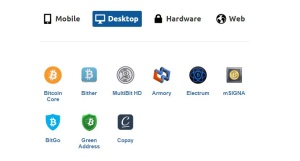Storing Bitcoin: Desktop Wallets

Desktop Wallets: MultiBit vs Bitcoin QT vs Electrum
For storing Bitcoin you need a wallet. A “wallet” is the Bitcoin equivalent of a bank account. It allows you to receive Bitcoin, store them, and then send them to others. The basic choice is whether you are going to self-host the wallet (i.e., install it on a computer or mobile device you own) or whether you are going to rely on someone else to host it on their computers (external hosting).
For self-hosting you have to worry about security and backup. For external hosting you have to be confident that the external host is going to do a good job on security and backup provided you look after your own access information. In this post we are going to focus on self-hosted wallets installed on a desktop computer for storing Bitcoin (i.e., not mobile wallets).
The video does an in depth walk through of three leading wallets (as at the time the video was created)
 Bitcoin-QT (now called Bitcoin Core) is the original Bitcoin wallet. It is a well tested and scrutinised wallet. Bitcoin Core is a fully fledged node of the Bitcoin network. So it requires the entire blockchain to run (in excess of 40 gigabytes). Each time you load up the wallet, it will synchronise the blockchain – not exactly a fast way to be transacting Bitcoin. Bitcoin Core is available on Windows, Linux and Mac
Bitcoin-QT (now called Bitcoin Core) is the original Bitcoin wallet. It is a well tested and scrutinised wallet. Bitcoin Core is a fully fledged node of the Bitcoin network. So it requires the entire blockchain to run (in excess of 40 gigabytes). Each time you load up the wallet, it will synchronise the blockchain – not exactly a fast way to be transacting Bitcoin. Bitcoin Core is available on Windows, Linux and Mac- MultiBit (now called MultiBit HD) is a third party wallet. MultiBit HD is a lightweight client – i.e., it does not download the entire blockchain – that is fast and easy to use. It provides a simple approach to saving a copy f the private keys. MultiBit HD is available on Windows, Linux and Mac
- Electrum is also a lightweight client – i.e., lets you perform Bitcoin transactions without having to download the entire blockchain. Electrum uses a network of servers to achieve this – for some this raises security risks. Electrum provides specific tools to recover a wallet using what they call seeds (a random set of words). It also allows use across multiple devices which makes it very handy if you are using multiple machines. It also gives you a way to look at other wallets you manage. Electrum is available for Windows, Mac, Linux and Android.
Key things to bear in mind
- Security: Password protect your wallet – needs to be a very secure password (mix of lowercase and uppercase letters, numbers and symbols – 16 characters or more)
- Security: Encrypt your wallet
- Multifactor Authentication: Requires confirmation of your access from a second source (e.g., a mobile phone or a mobile authenticator)
- Privacy: Using multiple Bitcoin addresses
- Tracking: Being able to identify where Bitcoin have come from by using multiple addresses. Electrum starts with 5 addresses as a default.
- Backup: Make a copy of your private keys and keep in a secure place separate from the computer
- Synchronisation of Backlogs: Sometimes the wallet goes out of synchronisation. This requires a technical fix – easily done in MultiBit HD but requiring some technical skills in Bitcoin Core (I know I have done it on my QT wallet)
Video from SecureYourWallet.com – note: Gareth confuses gigabits and gigabytes – he means gigabytes. Currently the blockchain is over 40 gigabytes and will take 3 to 4 days to download. For up to date information read answers to this Quora.com question “How long should I wait for my Bitcoin Core wallet to sync?”
If you liked the video you could give Gareth a Bitcoin tip: 1GAretHEXfPiBhqPmny7GD6sMTm5MnZVsU
Image from Bitcoin.org where you can find some more recent wallets in addition to these three.


